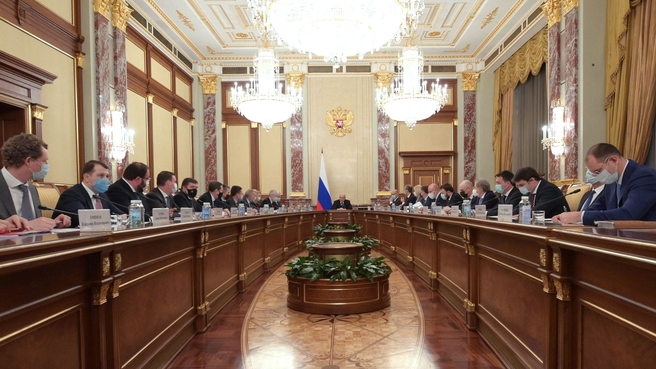Mikhail Mishustin: “We have a plan to mitigate the sanctions which not only must be fulfilled but, of course, also continuously updated as the situation develops. We need to promptly develop the third package of legislative initiatives as well as a number of regulatory acts.”
Mikhail Mishustin’s opening remarks:
Good afternoon, colleagues.
We continue working to increase the stability of the Russian economy. Yesterday, we discussed the situation at length during a meeting with the President.
The first package of counter-sanction measures has already been approved by the parliament. The second package was submitted to the State Duma this week and includes all the new initiatives to support people, financial markets, certain sectors of the economy and businesses in general.
These measures include income tax exemption for bank deposit holders (on the profit from the deposits and the interest on employer loans). The transport tax will be adjusted. There are also measures to support the construction industry, tourism, civil aviation, maritime and railway transport. Registration of foreign companies will be simplified in special administrative areas. The list of products that can be produced in special economic zones will be expanded. We are also resuming the special investment contract scheme and more.
This work must continue. The unfriendly actions of the United States and its allies have created an unprecedented situation. The fundamental rules of international trade have literally been discarded. We are witnessing blatant lobbying of commercial interests. There is tension even in those areas where there should be no politics whatsoever, including sports, culture and science. Our fellow nationals who study or reside abroad are encountering problems.
Under pressure from their governments, foreign owners of Russian businesses are taking the decision to suspend their operations in this country.
This is creating risks for the quality of life of Russian citizens. Nevertheless, we regard as a positive signal the fact that the majority of owners are ready to preserve the jobs and pay wages to their staff.
It is quite important today to constantly monitor the situation and take timely decisions in order to mitigate the effect of these changes. We have a plan of anti-sanction work. It should be not only implemented but also steadily upgraded in line with developments.
We must rapidly prepare a third package of legislative initiatives and a number of regulations.
The work has been completed on some of these tasks. For example, we have approved a list of industries in the segment of small and medium-sized businesses which can count on a loan repayment holiday. Businesses that took out a loan before 1 March will have an opportunity to agree on a payment deferral for up to six months. The deferral will be granted to those involved in agriculture, tourism, science, culture, public catering, medicine, software development, and food, furniture and garment production, as well as trade.
We are drafting initiatives aimed at supporting vitally important companies. Rules have been devised for granting subsidies towards loans drawn to finance working capital. They will receive easy loans at 10 percent interest based on this mechanism.
There are decisions to support those involved in state procurement. Sanctions-hit companies will be given the right not to publish lists of their contractors to relieve them of unnecessary risks. Ordering customers will be able to write off penalties, late charges and fines in relation to suppliers, who are unable to properly fulfil their obligations because of sanctions.
Colleagues, today we will see what additional measures will be needed to support the economy and our people.







